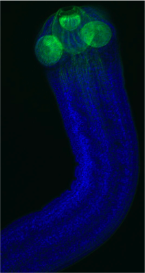Biography
Magdalena Zarowiecki focused on evolutionary biology and systematics during both her Master of Science in Zoological Systematic and Morphology at Gothenburg University, Sweden, and her Master of Research in Biosystematics, at Natural History Museum and Imperial College, London. She has experience of working with a range of non-model worms; ribbon worms, Oligochaetes, Cestodes and Trematodes, as well as a wider knowledge of tropical diseases from a Ph.D. in the population genetics of mosquitoes transmitting malaria. She previously held a postdoctoral position funded by the SynTax scheme, working with assembly and annotation of the genome of Hymenolepis microstoma, and comparative phylogeny of flatworm genomes.
Research
The current research is focusing on comparative genomics of parasitic flatworms. The most important platyhelminth parasites of humans and livestock include the genera Taenia, Hymenolepis, Echinococcus and Schistosoma. Although most platyhelminths are not fatal to humans, they will have severe impact on the health and productivity of the poorest people in developing countries, hindering development and economic growth. The broad aim of the postdoctoral project is to develop comparative genomics of flatworms within the Parasite Genomics group. Producing good-quality gene models and annotations are vitally important in making the genome data accessible and useful. We use of a range of high-throughput approaches to increase the accuracy and biological depth of our platyhelminth annotations, using a combination of RNAseq, gene-prediction, methylome studies, re-sequencing and microRNA studies in order to understand the gene and RNA content of platyhelminth genomes. The research will actively respond to the needs of the platyhelminth community, and seek to lay the groundwork for future translational research.
Publications
Cestode genomics - progress and prospects for advancing basic and applied aspects of flatworm biology.Olson PD, Zarowiecki M, Kiss F, Brehm K.Parasite Immunol. 2011 Jul 27. DOI: 10.1111/j.1365-3024.2011.01319.x. PMID:21793855
Towards a new role for vector systematics in parasite control. Zarowiecki M, Loaiza JR, Conn JE. Parasitology. 2011 Jun 17:1-7.PMID:21679487
Pleistocene genetic connectivity in a widespread, open-habitat-adapted mosquito in the Indo-Oriental region. Magdalena Zarowiecki, Catherine Walton, Elizabeth Torres, Erica McAlister1, Pe Than Htun, Chalao Sumrandee, Tho Sochanta, Trung Ho Dinh, Lee Ching Ng, Yvonne-Marie Linton. Journal of Biogeography, article first published online: 11 Mar 2011, DOI: 10.1111/j.1365-2699.2011.02477.x
Rapid evolution of yeast centromeres in the absence of drive. Bensasson D, Zarowiecki M, Burt A, Koufopanou V. Genetics. 2008 Apr;178(4):2161-7. PMID:18430941
Making the most of mitochondrial genomes--markers for phylogeny, molecular ecology and barcodes in Schistosoma (Platyhelminthes: Digenea). Zarowiecki MZ, Huyse T, Littlewood DT. Int J Parasitol. 2007 Oct;37(12):1401-18. Epub 2007 May 10. PMID:17570370


